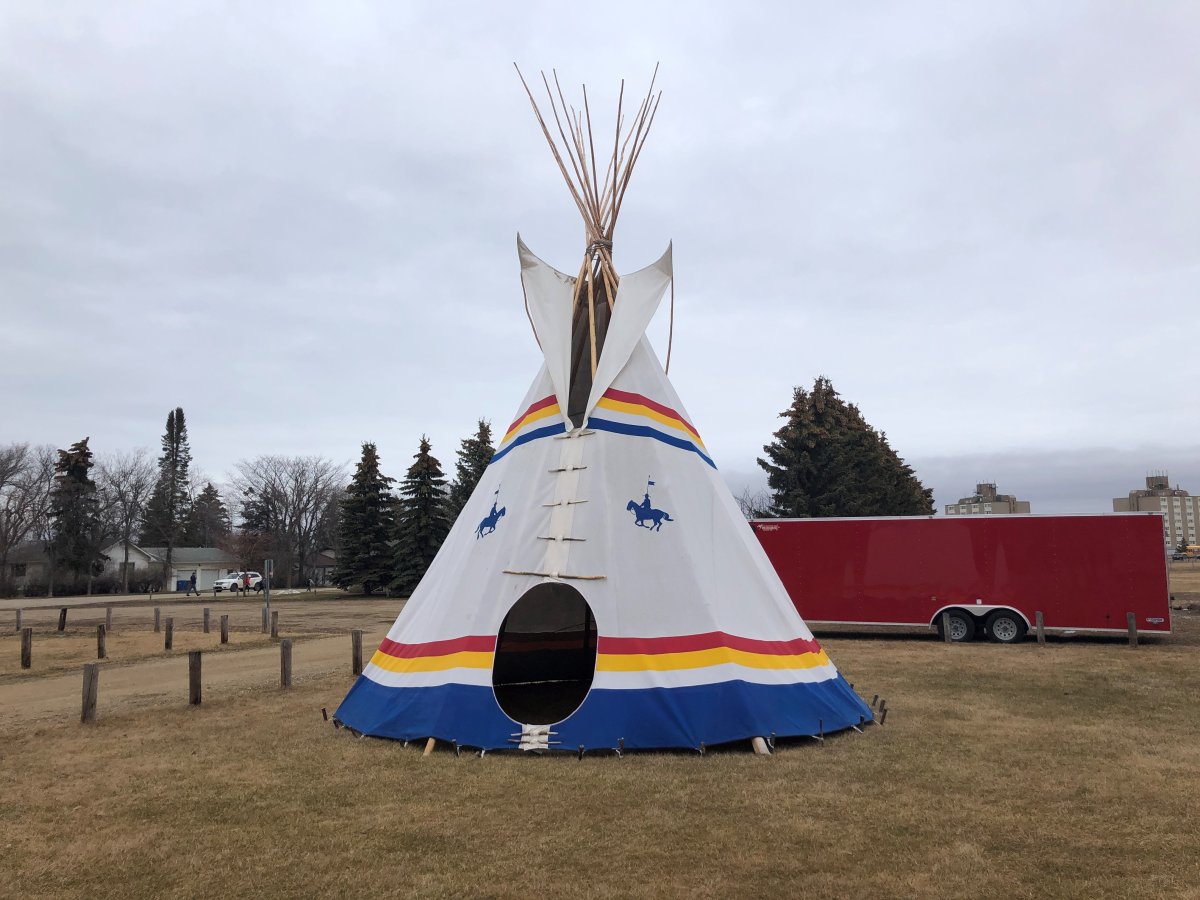Monday, September 4 will be a sombre day for many in Saskatchewan as it marks the anniversary of the James Smith Cree Nation stabbings that left 11 people dead and 17 injured.

Assistant Commissioner Rhonda Blackmore is the commanding officer for the Saskatchewan RCMP and said the ripple effects that the stabbings have had on the RCMP have been significant.

“When you look at how that incident unfolded and the chaos that was present,” Blackmore said.
She said some RCMP officers have been dealing with trauma due to the stabbings, but added that it’s important to learn lessons from incidents like that.
Blackmore said the initial call was for a stabbing incident, saying while that wasn’t a routine call, it was something that they felt two RCMP members could handle.
“And then the calls started coming, and more, and more, and more, and you have injured people, you have deceased people, you have people in the community who are terrified.”
She said they had over 500 officers from across the country assist in the initial police response. 369 were from Saskatchewan.
Blackmore said there’s still trauma and anxiety attached to getting a call to James Smith Cree Nation now.

“It certainly brings that trauma in the community to the forefront very quickly. There’s always a concern for public safety when someone is making threats anywhere, but when you have individuals who have lived that trauma it’s a different scenario.”
Blackmore said they’ve also been looking at ways to improve things, and that an independent officer review will be coming down sometime after the Coroner’s inquests.
“That was completed by an outside division. RCMP out in Alberta led that for us, and eventually we will be making that information public.”
The Saskatchewan Coroners Service is doing two separate inquests, one into the deaths of the 11 victims, and another into the death of Myles Sanderson, the man who killed and injured so many.
- B.C. Sikh leader ‘vindicated’ by arrest of Indian nationals in Nijjar killing
- London Drugs remains closed, says it is reviewing billions of lines of data
- Trump trial hears recording discussing hush money scheme: ‘What do we got to pay?’
- How toy guns brandished by Ontario youth in ‘assassins game’ is prompting real fear
Global News reached out to the Coroners Service for an interview, but received some dates and information instead.
The inquest for the 11 victims in James Smith Cree Nation and Weldon is currently scheduled to be held from Jan. 15-26 at the Kerry Vickar Centre in Melfort.
The Coroners Service said it has been meeting with family members of the victims and leadership of the First Nation, adding that a family liaison consultant will be working with families over the Fall to prepare them for the inquest.
“An inquest for Myles Sanderson will be held separately. As he died in custody, a mandatory inquest is required. His inquest will be held in Saskatoon after the larger inquest into the deaths of the victims. While timelines are still being finalized, we expect the inquest into Sanderson’s death to take place in February or March of 2024,” the Coroners Service said.

The inquests were initially scheduled for the Spring or Summer of 2023, but Chief Coroner Clive Weighill noted back in February that the investigation was very complex and that the RCMP was still receiving new information at the time.
When asked if the First Nation was safer now than it was a year ago, Blackmore said they now have a security team in place who can relay information to officers.
She added the RCMP in the area are at the Melfort detachment and cover a large geographical area.
“Having those security resources has been a really positive addition to response, because our members have a really good relationship with those security members.”
She said that doesn’t replace a police officer, but added the security team is extra eyes and ears.
“These are individuals who are roving the community and they’re from the community, which I think is a big piece of that, because they know the individuals.”
She said it’s important to have an understanding of that community and those who live within it.
Blackmore said they are also making efforts to recruit more First Nations people to the RCMP, noting this was an initiative that started in the province before the stabbings, but didn’t have all the pieces in place until September 2022.
“Absolutely, incredibly successful initiative in that we’ve been able to reach into individuals who may not otherwise have thought about policing as a career option.”
She said the people on the frontline doing the recruiting are Indigenous members, noting one was a part of an all Indigenous troop back in the early 2000s.

“One of the other recruiters, she’s fully fluent in Cree, so very much able to relate to some of those challenges within our communities and speak about culture and understanding, and what that’s like.”
She said some of the darker history of the RCMP can make some First Nations people hesitant about becoming a part of the organization.
“Everyone knows the history of the RCMP are involved in residential schools, those types of aspects of it, but sometimes I think that makes Indigenous people a little hesitant, ‘is that an organization that I want to be a part of,’ and when they can hear our members who are Indigenous themselves, they can relate to that experience.”
Blackmore said they are looking to address barriers in some of the more remote communities in Saskatchewan, adding some parts of the RCMP recruiting process can create additional challenges for people in those communities.
She said they currently have three Indigenous recruiters.
“Those three individuals spoke to 172 potential applicants, and of that, 102 applied.”
Blackmore said those were big numbers.
“They are positively changing what policing looks like in this province so that we ensure that it’s more representative of the populations we police.”
She said with large Indigenous population in Saskatchewan, the RCMP isn’t currently reflective of that.
Even before the stabbings in James Smith Cree Nation there have been calls for First Nations policing to be established on reserves in Saskatchewan and across Canada, but those voices became even louder after the Sep. 4, 2022 event.

Drafts were created for a First Nations police services bill, but documents obtained under the Access to Information Act by The Canadian Press showed the drafts hit some roadblocks, one of the main ones being a disagreement between the Assembly of First Nations and the feds when it came to jurisdiction.
Blackmore said it’s frustrating to see stumbling like this when it comes to things like jurisdiction.
“At the end of the day what has to be the main focus, and cannot be compromised, is providing the best policing services we can for our First Nations communities.”
She said to achieve that there needs to be a commitment of resources and funding.
“I can tell you we do need additional resources if the RCMP is going to continue to be the service provider. We need additional resources to make sure that we are meeting the mandate of delivering that not only responsive policing services, but proactive policing services on our First Nations.”
She said many detachments face geographical and isolating challenges when it comes to some of Saskatchewan’s more remote communities.
When asked about what kind of information people can expect to come from the inquests, Blackmore wouldn’t reveal much, but said the inquests can get into a lot of details and added that they want to maintain the sanctity of that.
“So I think that will certainly provide some answers that maybe people feel they haven’t gotten yet.”
A timeline of the stabbings that took place in James Smith Cree Nation and Weldon was presented by the RCMP near the end of April, going over in a four hour presentation where Sanderson had gone on his erratic rampage.

Blackmore said the purpose of the timeline was intended to give victims, survivors, and families as much information as possible that could be released without jeopardizing the inquests.
She added the RCMP are expected to, and have a duty to show some transparency to the public, but the timeline had more meaning to those who were directly affected.
“For those families, it’s a different level. This is very much a personal event to them. They need some of those answers to help them with their own healing, and that was really a large motivator to try to get as much information to them as early as possible without compromising the Coroners inquests.”
Blackmore hopes that with as much interest as there is into the incident, people understand the impact of what happened.
“The impact to the community, to individuals, and to the first responders, my members who did some exceptional work in responding in a very trying time, you also have the paramedics and all of those types of individuals who are impacted by the chaotic situation, and the traumatic situation they were dealing with.”
She said she’s proud of the first responders who act in these kinds of incidents, but noted they are all human and these events impact them as well.
— With files from The Canadian Press




Comments